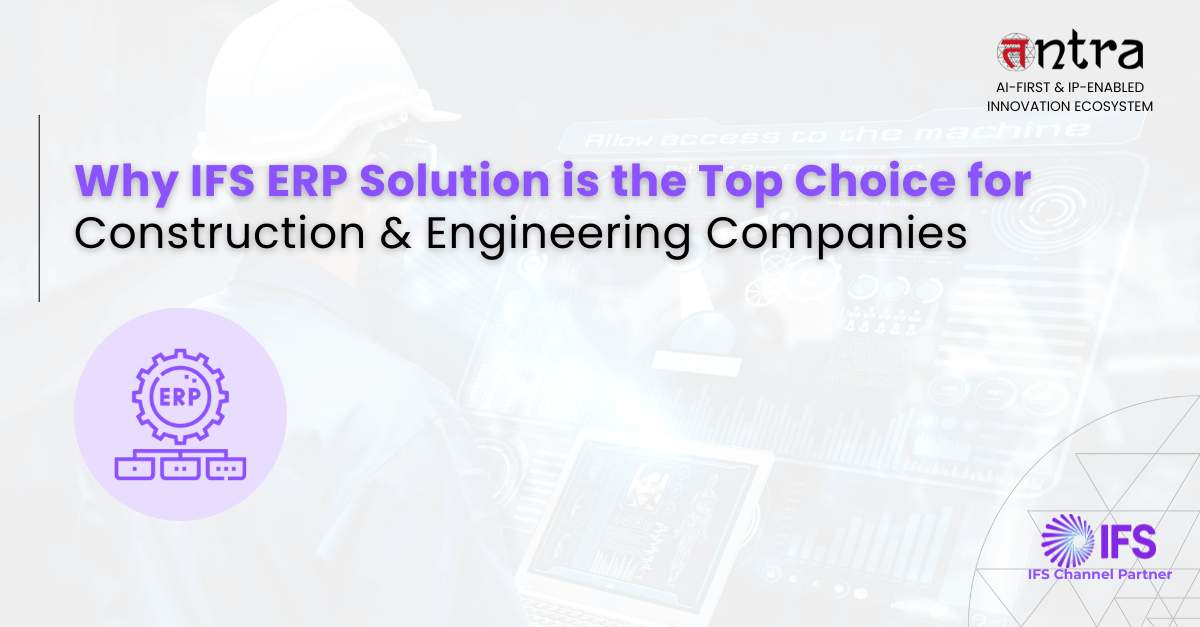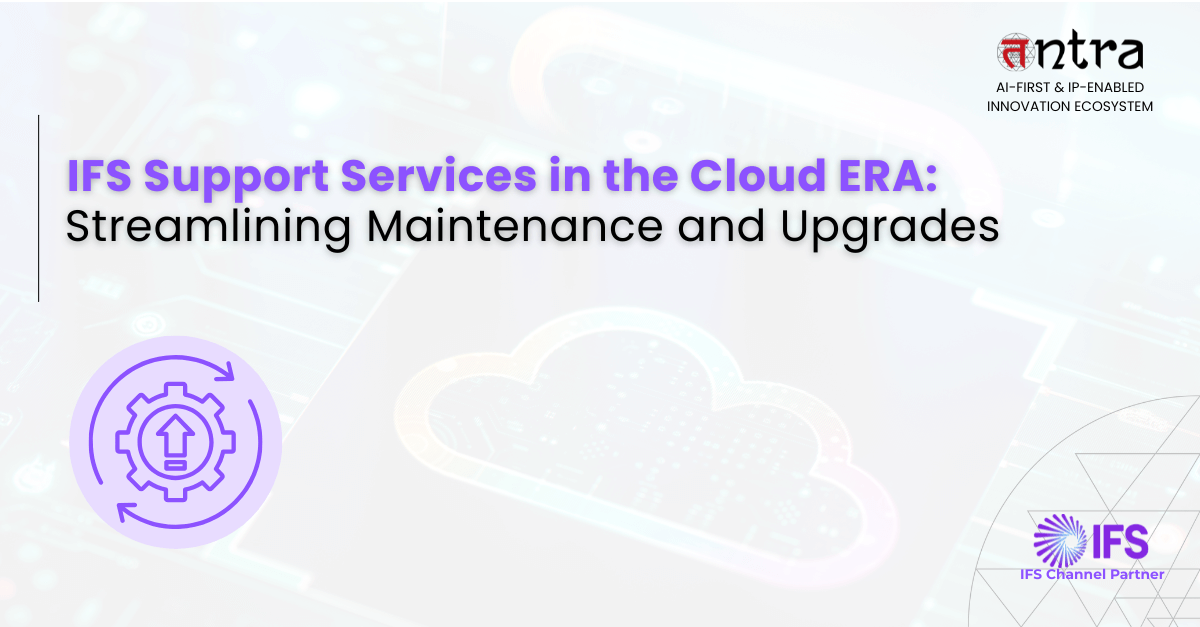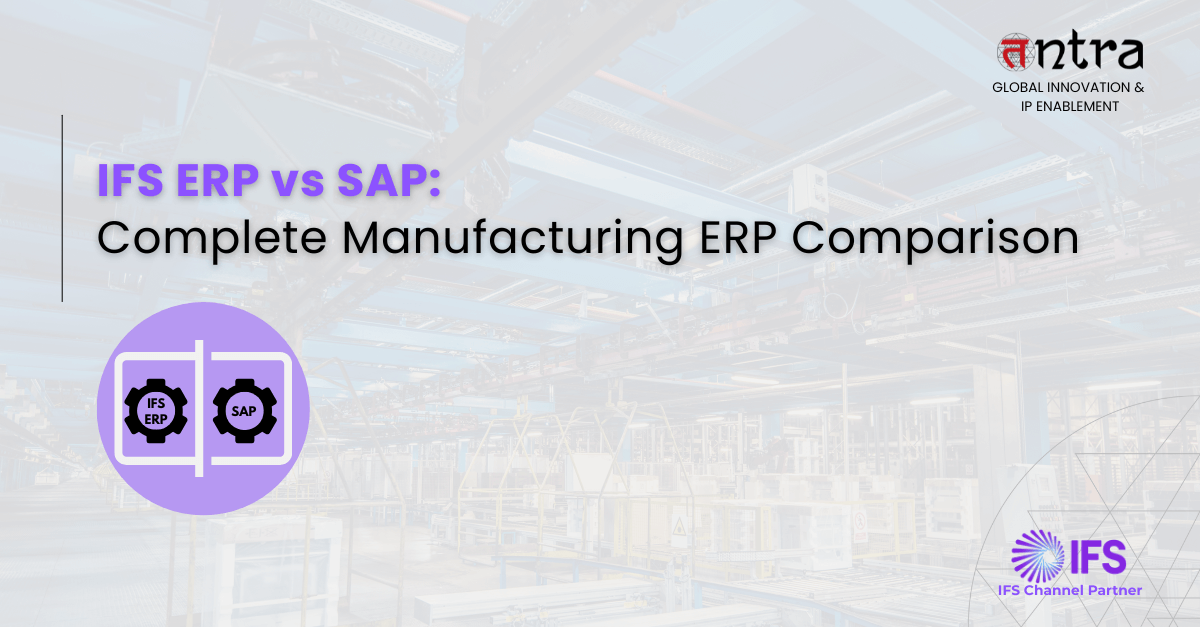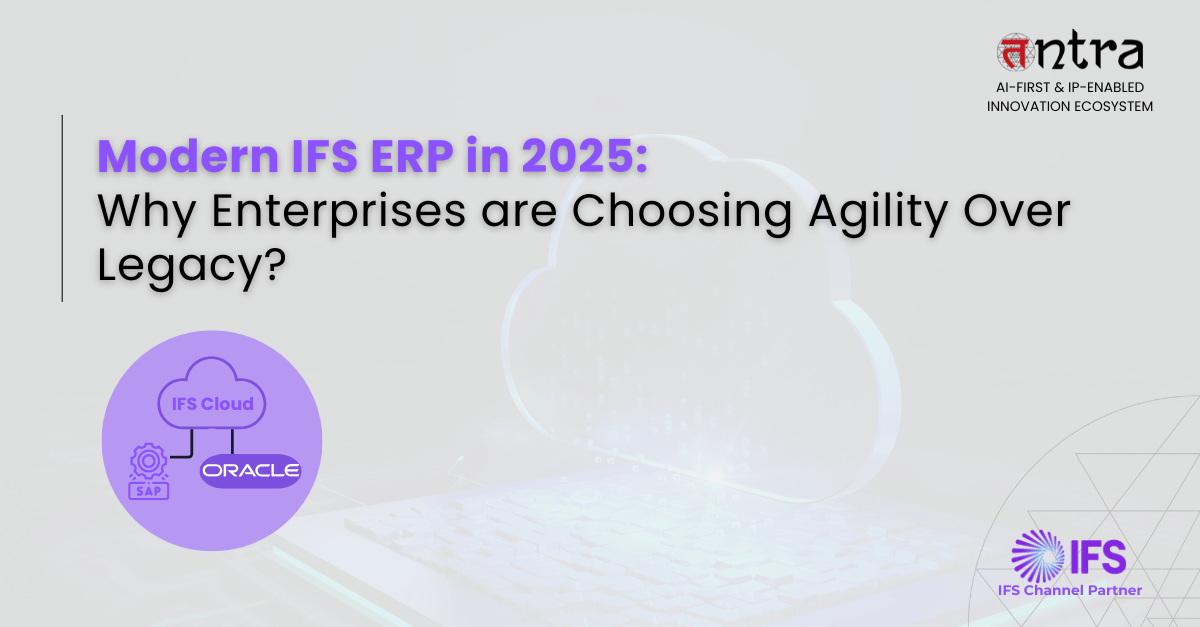
Modern IFS ERP in 2025: Why Enterprises are Choosing Agility Over Legacy?
Table of Contents
ToggleBy 2025, enterprise technology leaders are rethinking legacy ERP giants. IFS Cloud stands apart with its composable, cloud-native design and embedded Industrial AI—empowering project-centric agility, real-time visibility, and streamlined upgrades. Compared to SAP’s complex licensing and Oracle’s acquired modules, IFS Cloud offers faster implementations (often under 12 months), clear value-based pricing, and out-of-the-box industry solutions. This modern ERP platform reduces total cost of ownership, aligns business and IT teams, and accelerates digital transformation. Forward-looking organizations now choose IFS Cloud as the strategic, nimble alternative to SAP and Oracle. Continue reading to learn more.
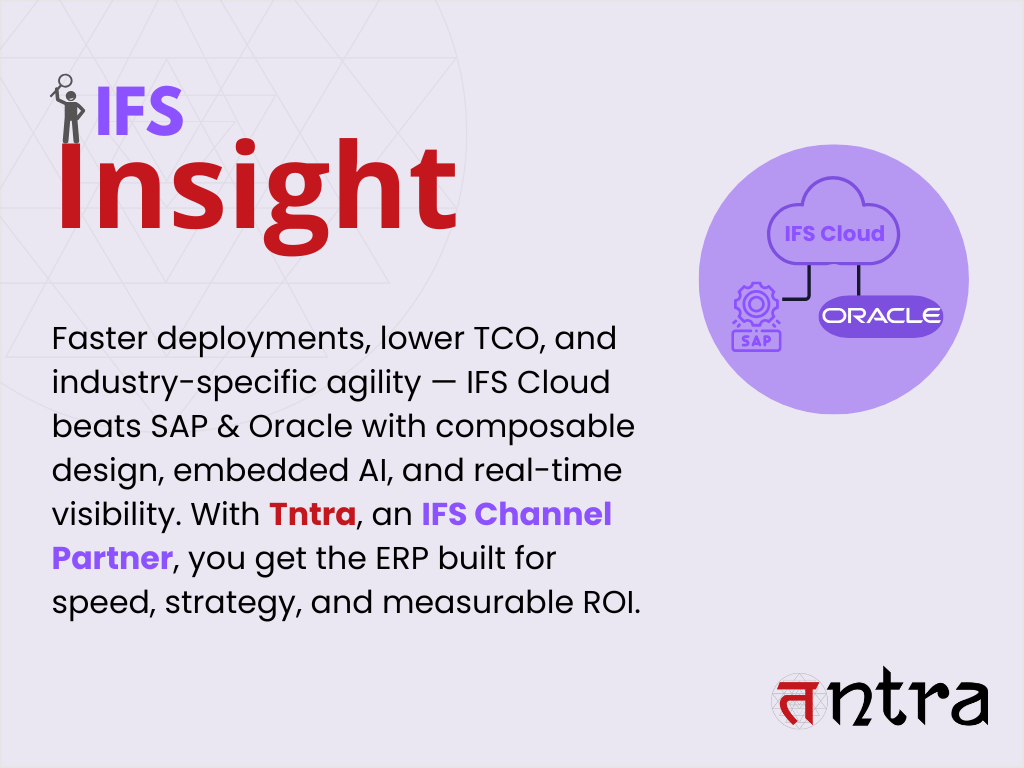
ERP is no longer what it used to be.
Back in the day, ERP (Enterprise Resource Planning) systems were known for being big, complex, expensive, and slow to implement. Most large companies went with trusted names like SAP or Oracle, and spent months, or even years, customizing everything before they could go live.
But things have changed.
In 2025, businesses don’t have the luxury of waiting 18 months to see results. The world moves fast, and today’s business leaders need IFS ERP systems that move even faster.
That’s why more and more companies are turning to modern IFS ERP solutions like IFS Cloud, designed to help businesses work smarter, adapt quickly, and get real value without all the fuss.
What’s Changed? CXOs Want Results, Not Just Features
When CIOs, COOs, and CFOs look at ERP today, they’re not just checking off features on a list.
They’re asking:
- How soon can we go live?
- How fast can we see results?
- Can this system help our teams collaborate better?
- Will it save us money, time, and energy?
- Can it grow with us?
The old way of doing ERP, with huge setups, expensive customizations, and long delays, just doesn’t work anymore.
What companies need now is agility, clarity, and real outcomes. And that’s exactly what IFS Cloud Solutions offer.
ERP Has Evolved: CXOs Prioritize Speed, Agility, and ROI
By 2025, enterprise technology leaders are rethinking legacy ERP strategies. While SAP and Oracle have long been trusted IFS ERP providers, widely adopted across large enterprises for their comprehensive feature sets and global reach, organizations are increasingly seeking solutions that deliver agility, faster time-to-value, and measurable ROI.
Meet IFS Cloud: A Modern ERP for a Faster World
So, what makes IFS applications for the cloud different from traditional ERP systems?
It’s not just another version of what came before. IFS Cloud is built from the ground up for the modern, fast-moving business world.
Here’s what that means in simple terms:
1. Built for the Cloud, From Day One
This isn’t a legacy system that got pushed into the cloud later. IFS Cloud was designed to work in the cloud from the start. That means:
- Faster updates
- Easier scaling
- Lower IT headaches
- No heavy infrastructure to manage
You can start small, then add more features as you grow. It’s flexible, not rigid.
2. Ready for Your Industry
Many ERP systems require tons of customization to fit your business. That takes time and money.
IFS Cloud comes with industry-specific features already built in, for sectors like:
- Manufacturing
- Aerospace
- Energy
- Construction
- Telecom
- Service industries
This means less setup, fewer delays, and faster value.
3. Project-Centric by Nature
If your business runs on projects, like building something, delivering services, or managing assets, IFS Cloud is made for you. It helps you:
- Plan and manage complex projects
- Track progress in real-time
- Connect finance, operations, and delivery
4. AI That Actually Helps
IFS Cloud includes AI and automation tools that make daily work easier. For example:
- Predict when a machine needs maintenance before it breaks
- Automate routine approvals and workflows
- Show real-time insights for faster decision-making
It’s not just “smart” for the sake of it. It’s useful where it matters.
How IFS Cloud Compares to SAP and Oracle
Now, SAP and Oracle are still excellent ERP platforms. They’ve served millions of businesses for decades, and they continue to innovate.
Here’s a simple, positive comparison to help you understand where each one shines:
| Feature | SAP S/4HANA | Oracle ERP Cloud | IFS Cloud |
| Built For | Global corporations | Large-scale enterprise ops | Project-based and asset-heavy industries |
| Cloud Readiness | Strong (migrated) | Strong (modular) | Cloud-native from day one |
| Customization Needed | High | Medium | Low, prebuilt for your industry |
| Speed of Implementation | Medium | Fast | Very fast (thanks to ready-made templates) |
| Focus Area | Enterprise-wide control | Finance & operations | Project, asset, and service excellence |
| AI Capabilities | Powerful analytics | Automation + intelligence | AI tailored to real operations |
All three platforms are capable. But IFS Cloud is winning fans for being faster to deploy, easier to use, and better suited for companies that need results quickly and want to keep things simple.
How Fast will you See Value?
Let’s be honest. ERP used to be a long-term investment. You’d wait months, or years, to see the real benefits.
That’s not how it works anymore.
With modern ERP systems like IFS Cloud, you can go live quickly and start seeing value fast. Here’s how IFS consultants help:
1. Faster Go-Live
Thanks to industry-ready features and modular design, you can launch IFS Cloud in half the time compared to traditional ERP systems.
2. Lower Total Cost of Ownership
Less customization. Fewer upgrades. No hidden IT costs. That’s more money saved in the long run.
3. Real Operational Improvements
- Cut downtime with predictive maintenance
- Improve service delivery with real-time tracking
- Make smarter decisions with live dashboards
Why Your Teams will Actually Like using It
Let’s not forget: ERP only works when people actually use it.
One big reason companies struggle with ERP is that it’s too hard or clunky for everyday users. The systems feel old, slow, or overloaded with too many features.
IFS channel partners take a different approach:
- Clean, simple design
- Mobile-friendly tools
- Role-based views for every team
That means your people, from finance to field service, can do their jobs faster and easier. And that leads to higher adoption, better performance, and smoother operations.
Is IFS Cloud Right for You?
Here’s how to tell if IFS Cloud might be a good fit:
- You want to go live fast, without endless customizations
- You need industry-specific capabilities, without building from scratch
- Your business is driven by projects, assets, or services
- You care about user experience as much as features
- You want measurable ROI, not just another tool in your stack
If that sounds like your company, it’s worth exploring IFS Cloud further.
ERP is Now a Strategic Driver
In the past, ERP was seen as a backend tool, important, but not exciting.
That’s changed.
Today, ERP plays a key role in how companies stay competitive. The right system helps you:
- Respond faster to market changes
- Launch new services or products quickly
- Serve customers better
- Empower your teams to do more with less
And the wrong system? It slows you down, eats up resources, and frustrates everyone.
That’s why more CXOs are prioritizing speed, simplicity, and impact, and turning to ERP platforms like IFS Cloud to lead the way.
Final Word: Can Your Business Afford to Wait?
ERP has come a long way. It’s no longer just for big corporations with endless budgets and IT teams.
IFS Cloud Consulting Services are:
- Easier to deploy
- Smarter to use
- Faster to deliver results
If you’re still using an older system, or considering an upgrade, it’s the perfect time to rethink your ERP strategy.
Because at the end of the day, it’s not about picking the “most powerful” tool.
It’s about choosing the tool that works for you, your team, and your goals.
IFS Cloud investment brings intuitive design, fast deployment, industry specificity, and proven results—making it the smart, strategic ERP choice for 2025 and beyond.
Thinking about switching to IFS Cloud ERP?
Hire an IFS ERP expert to assess your transformation roadmap
Schedule a call now!
FAQs
How Does IFS Cloud Support Digital Transformation?
IFS Cloud embeds AI, ML, IoT, and automation at every layer—enabling predictive maintenance, AI-driven forecasting, and workflow automation. This integrated intelligence drives faster, data-backed decisions and continuous process improvements.
What Is IFS Cloud?
IFS Cloud is a modern, cloud-native ERP platform built for asset- and service-centric industries. It offers modular deployments, real-time visibility, industrial-strength AI, and a unified UX for operations, finance, and service management.
Is IFS Better Than SAP?
For companies craving agility, lower TCO, and industry focus, IFS Cloud often outpaces SAP. It delivers shorter implementation cycles, simpler licensing, and pre-configured templates—versus SAP’s lengthy S/4HANA migrations and complex modules.
What Are the Benefits of IFS Cloud?
Key benefits include rapid time-to-value through lean implementations, clear value-based pricing, embedded Industrial AI, modular scalability, and pre-built industry templates—reducing customizations and ongoing consulting needs.
Why Choose IFS ERP?
IFS ERP aligns technology with your business strategy—offering unified operations, services, assets, and people management. Its composable architecture, continuous updates, and lower cost of ownership make it a future-proof choice.
Article Sources:
Key Reasons to Choose IFS Cloud ERP Software
 Download IFS Guide
Download IFS Guide 